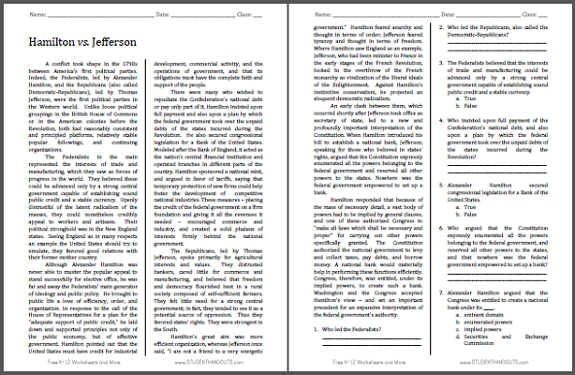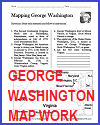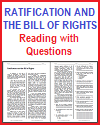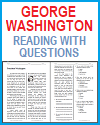| Hamilton vs. Jefferson Reading with Questions |
|---|
| www.studenthandouts.com ↣ American History ↣ American History Readings with Questions |
 A conflict took shape in the 1790s between America's first political parties. Indeed, the Federalists, led by Alexander Hamilton, and the Republicans (also called Democratic-Republicans), led by Thomas Jefferson, were the first political parties in the Western world. Unlike loose political groupings in the British House of commons or in the American colonies before the Revolution, both had reasonably consistent and principled platforms, relatively stable popular followings, and continuing organizations.
A conflict took shape in the 1790s between America's first political parties. Indeed, the Federalists, led by Alexander Hamilton, and the Republicans (also called Democratic-Republicans), led by Thomas Jefferson, were the first political parties in the Western world. Unlike loose political groupings in the British House of commons or in the American colonies before the Revolution, both had reasonably consistent and principled platforms, relatively stable popular followings, and continuing organizations.The Federalists in the main represented the interests of trade and manufacturing, which they saw as forces of progress in the world. They believed these could be advanced only by a strong central government capable of establishing sound public credit and a stable currency. Openly distrustful of the latent radicalism of the masses, they could nonetheless credibly appeal to workers and artisans. Their political stronghold was in the New England states. Seeing England as in many respects an example the United States should try to emulate, they favored good relations with their former mother country... Questions with answers in bold: 1. Who led the Federalists? Alexander Hamilton 2. Who led the Republicans, also called the Democratic-Republicans? Thomas Jefferson 3. The Federalists believed that the interests of trade and manufacturing could be advanced only by a strong central government capable of establishing sound public credit and a stable currency. a. True b. False 4. Who insisted upon full payment of the Confederation’s national debt, and also upon a plan by which the federal government took over the unpaid debts of the states incurred during the Revolution? Alexander Hamilton 5. Alexander Hamilton secured congressional legislation for a Bank of the United States. a. True b. False 6. Who argued that the Constitution expressly enumerated all the powers belonging to the federal government, and reserved all other powers to the states, and that nowhere was the federal government empowered to set up a bank? Thomas Jefferson 7. Alexander Hamilton argued that the Congress was entitled to create a national bank under its _____. a. eminent domain b. enumerated powers c. implied powers d. Securities and Exchange commission Click here to print. |
 |  |  |  |  |  |
| www.studenthandouts.com ↣ American History ↣ American History Readings with Questions |














































